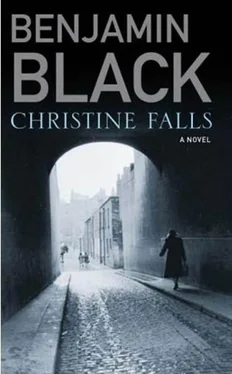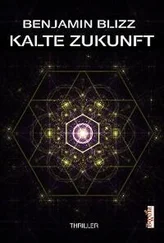Miss Flint took his hat and coat and led him off into the heart of the house, the thick rubber soles of her prison warder’s shoes squeaking on parquet and tile. As so often, Quirke found himself wondering what things she might know, what family secrets. Did she watch Mal, too, with that searching, lopsided stare, on his rare visits to his father’s house?
The Judge had heard the bell and had come to the door of what he called his den. When Quirke saw him standing there in his slippers and his old gray cardigan, nearly as tall as Quirke but stooped a little now, peering anxiously out of the shadows, it occurred to him that the day could not be far off when he would knock at the front door and be met by Miss Flint with a mourning band on her arm and her eyes red-rimmed. He stepped forward briskly, once again making himself smile.
“Get in here, man,” the Judge said from the doorway of the room, making shooing motions with his arm, “this hall is like a refrigerator.”
“Will you be wanting tea?” Miss Flint asked, and the Judge said, “No!” shortly and put a hand on Quirke’s shoulder and drew him into the room.
“Tea!” he said, shutting the door behind them with a thud. “I declare to God, that woman…” He led Quirke to the fireplace and an armchair beside it. “Sit down there and thaw yourself out, and we’ll have a drop of something stronger than tea.”
He went to the sideboard and busied himself with glasses and the whiskey bottle. Quirke looked about him at familiar things, the old leather-covered chaise, the antique writing desk, the Sean O’Sullivan portrait of Nana Griffin as a young wife, calmly smiling, marcel-waved. Quirke had been one of the few people the Judge would permit to enter this room. Even as a boy, half wild still from the years at Carricklea, he was allowed the run of the Judge’s den, and often of a winter afternoon, before he and Mal went off to board at St. Aidan’s, he would perch here, in this same chair, beside a banked coke fire that might have been this one, doing his sums and his Latin prep, while the Judge, still a barrister then, sat at his desk working on a brief. Mal, meanwhile, did his homework at the white deal table in the kitchen, where Nana Griffin fed him wholemeal biscuits and warm milk and quizzed him about his bowels, for Mal was considered to be delicate.
The Judge brought their whiskeys and handed Quirke his and sat down opposite him. “Have you had your dinner?” he asked.
“Yes, I’m fine.”
“Are you sure?” He peered at Quirke closely. Age had not dulled the old man’s keen ear, and he had heard the discomforted note in Quirke’s voice when he had telephoned and asked if he could come and talk to him. They drank in silence for a minute, Quirke frowning into the fire while the Judge watched him. The coke fumes, sharp as the smell of cat piss, were stinging Quirke’s nostrils.
“So,” the Judge said at last, large-voiced and forcedly hearty, “what’s this urgent matter you need to discuss? You’re not in trouble, are you?” Quirke shook his head.
“There was this girl…” he began, and stopped.
The Judge laughed. “Uh-oh!” he said.
Quirke smiled faintly and again shook his head. “No, no, nothing like that.” He looked into the shivering red heart of the fire. Get it over with . “Her name was Christine Falls,” he said. “She was going to have a child, but she died. She was being looked after by a woman called Moran. After Christine Falls’s death the Moran woman was murdered.” He stopped, and drew a breath.
The Judge blinked a few times rapidly, then nodded.
“Moran,” he said, “yes, I think I read something about it in the paper. The poor creature.” He leaned forward and took Quirke’s glass, seeming not to notice that there was a finger of whiskey undrunk in it, and rose and went again to the sideboard. Quirke said: “Mal wrote up a file on her-on Christine Falls.”
The Judge did not turn. “How do you mean, wrote up a file?”
“So as to leave out any mention of the child.”
“Are you saying”-he looked at Quirke over his shoulder-“are you saying he falsified it?”
Quirke did not reply. The Judge stood there, still with his head turned and still looking at him, and suddenly opened his mouth slackly and uttered a quavering sound that was halfway between a moan of denial and a cry of anger. There was the squeak of glass sliding off glass and the glugging of whiskey spilling freely from the neck of the bottle. The Judge grunted again, cursing his trembling hand.
“I’m sorry,” Quirke said.
The Judge, having righted the bottle, bowed his head and remained motionless for fully a minute. There was the sound of the spilled whiskey dripping on to the floor. The old man was ashen-faced. “What are you telling me, Quirke?” he asked.
“I don’t know,” Quirke said.
The Judge came with their topped-up whiskeys and sat down again.
“Could he be struck off?” he asked.
“I doubt it would come to that. There’s no real question of malpractice, that I know of.”
The Judge gave a sort of laugh. “Malpractice!” he said. “By the Lord, there’s a pun in bad taste.” He ruminated angrily, shaking his head. “What connection did he have with this girl, anyway? I suppose she was his patient?”
“I’m not sure what she was. He was taking care of her, was how he put it. She had worked at the house for a while.”
“What house?”
“Sarah took her on as a maid, to help out Maggie. Then she got in trouble.” He looked at the Judge, who sat with eyes downcast, still slowly shaking his head, the whiskey glass forgotten in his hand. “He says he rewrote the file to spare the family knowing about the child.”
“What business was it of his to be sparing people’s feelings?” the Judge broke out hoarsely. “He’s a doctor, he swore an oath, he’s supposed to be impartial. Bloody irresponsible fool. What did she die of, anyway, the girl?”
“Postpartum hemorrhage. She bled to death.”
They were silent, the Judge scanning Quirke’s face, just as, Quirke thought, an accused before the bench in the old days might have scanned the Judge’s face, looking for leniency. Then he turned aside. “She died at Dolly Moran’s house, is that so?” he asked. Quirke nodded. “Did Mal know her, too?”
“He was paying her to look after the girl.”
“A fine set of acquaintances my son has.” He brooded, his jaw muscles working. “You spoke to him about all this, obviously?”
“He won’t say much. You know Mal.”
“I wonder do I.” He paused. “Did he say anything about this business with the people in Boston?”
Quirke shook his head. “What business is that?”
“Oh, he has a charity thing going out there, him and Costigan and that Knights of St. Patrick crowd, helping Catholic families, supposedly. Your father-in-law, Josh Crawford, funds it.”
“No, Mal said nothing about that.”
The Judge drank off the whiskey in his tumbler in one quick go. “Give us here your glass, I think we need another stiffener.” From the sideboard he asked, “Does Sarah know about all this?”
“I doubt it,” Quirke said. He thought again of Sarah by the canal that Sunday morning, looking at the swans and not seeing them, asking him to talk to her husband, the good man . How could he say what knowledge she might or might not have? “I only know about it because I stumbled on him while he was writing up the file.”
He got to his feet, feeling suddenly overcome by the heat of the room, the fumes from the fire, the smell of the whiskey the Judge had spilled, and the raw, scorched sensation on the surface of his tongue from the alcohol. The Judge turned to him in surprise, holding the two glasses against his chest.
Читать дальше












